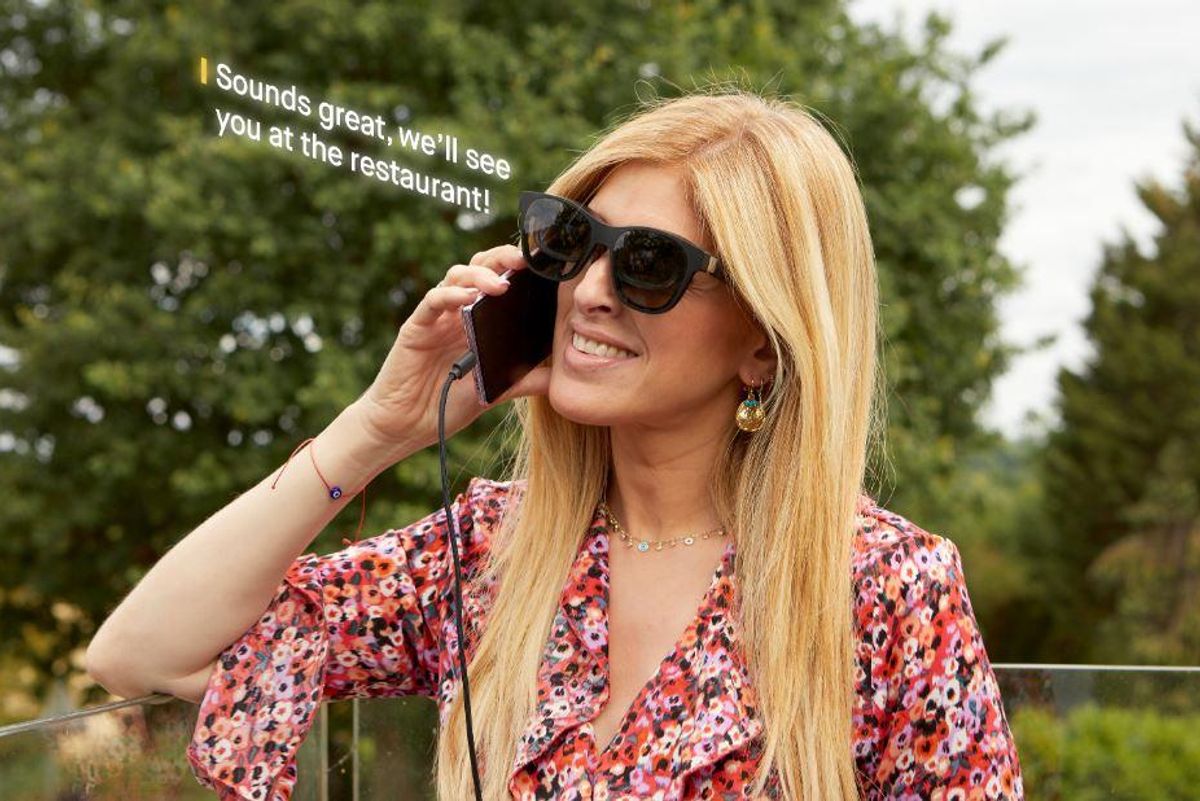Incredible new glasses allow deaf people to read real-time conversations with subtitles
It’s like watching a TV show with subtitles, but in real life.

XRAI Glass' new AR glasses for the hearing impaired.
A new invention looks like it may completely change how hearing-impaired people communicate with the rest of the world. According to EuroNews, XRAI Glass has developed augmented reality glasses that allow people who have difficulty hearing to read real-time conversations in their glasses through closed-captioning.
It’s like watching a TV show with subtitles, but in real life.
The idea came from Dan Scarfe in January while he was spending time with his 97-year-old grandfather. His grandfather wasn’t participating with the rest of the family because he couldn’t hear their conversations.
“It's just so difficult when there are so many people around you and you're trying to keep track of the different conversations which are going on,” Scarfe told Euronews. “It’s got to the point now where he literally just sits in silence. And I thought, well, hang on a second. He watches TV all the time with subtitles. Why can't we subtitle the world?”
Now, just seven months later, his new company XRAI Glass is already testing its closed-captioning glasses on 100 people before they’re released to the public.
To make the glasses a reality, Scarfe and his team used software based on Amazon's Alexa transcription service and combined it with glasses made by augmented reality manufacturer Nreal. The result is comfortable glasses that look natural while allowing the wearer to read the text of the person with whom they are speaking.
Josh Feldman, who was born with profound hearing loss, says that the glasses are “quite extraordinary,” he told The Daily Mail. “The impact of being able to not rely on looking at someone's lips and being able to talk to them is clearly something which could be life-changing.”
Hannah Brady, 60, who has 60% hearing loss in both ears agrees.
“Gosh that's really accurate,” she said according to The Daily Mail. “What's brilliant about it is it's not getting in the way of what I'm trying to see either.”
The glasses also have the support of the Royal National Institute for Deaf People (RNID). “This is a great example of the positive difference innovative technology can make for people who are deaf or have hearing loss,” RNID CEO, Mark Atkinson, said in a statement. “XRAI glass is intuitive and simple to use and could be a powerful tool in ensuring people with hearing loss don't feel excluded in social settings.”
The technology is similar to a prototype that Meta revealed earlier this year that was highlighted by Upworthy. The software connects to existing hands-free wearable devices such as Microsoft’s HoloLens and provides subtitles for conversations.
\u201cThese augmented reality glasses help deaf people see live captions of people's speech \n\nBy @paul_mealy\n\n#techforgood #innovation #technology #AR #VR #augmentedreality\n\n@TechAmazing @sebbourguignon @Nicochan33 @KirkDBorne @mvollmer1 @pierrecappelli\u201d— Pascal Bornet (@Pascal Bornet) 1647922692
However, it's uncertain when this technology will be available to the general public.
The good news for those who are interested in trying XRAI glass is that if all goes well, they could be available to consumers in the near future.
“We're going with a small number to begin with to prove it out, to get the feedback, to understand what people like, what they don't like, [and] rapidly innovate on that,” Scarfe told EuroNews.
“And then we're hoping if the winds are behind us, then we will reach general availability by September,” he added.
- A Starbucks barista gave a note to a deaf man and became a ... ›
- Deaf man moved to tears after his neighborhood secretly learns sign ... ›
- These kindergarteners surprised their school's deaf custodian by ... ›
- Why we all need subtitles when watching television - Upworthy ›
- Why we all need subtitles when watching television - Upworthy ›
- Artist Cristina Martinez on how technology can bring stories of hope and joy to new communities - Upworthy ›
- Gen X mom can't understand her kids' love for subtitles - Upworthy ›
- How everyday listening habits are putting young people at risk - Upworthy ›





 Rihanna Nails GIF
Rihanna Nails GIF

 Good luck trying to catch a gazelle.
Good luck trying to catch a gazelle. Chickens will eat just about anything.
Chickens will eat just about anything. There's actually a big difference between horses and zebras besides just the stripes.
There's actually a big difference between horses and zebras besides just the stripes. Stop Right There The End GIF by Freeform
Stop Right There The End GIF by Freeform